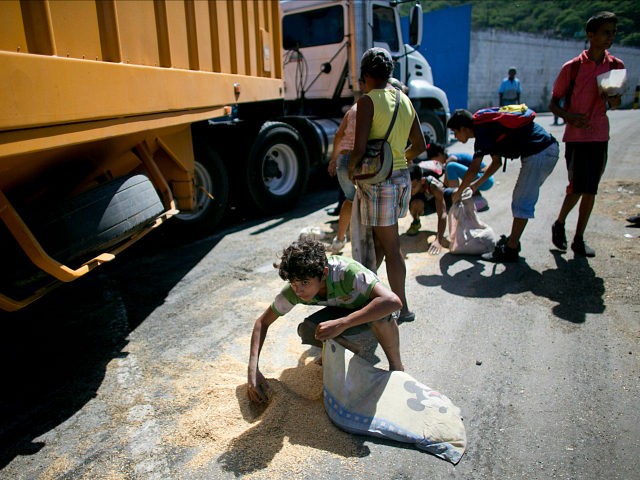The military under the socialist regime of Venezuelan President Nicolas Maduro is capitalizing on the misery of the people they are sworn to protect by running illegal markets that sell food at 100 times the government-set price while much of the South American country finds itself on the verge of starvation, the Associated Press (AP) has learned.
“Lately, food is a better business than drugs,” retired Venezuelan Gen. Cliver Alcala told the AP. “The military is in charge of food management now, and they’re not going to just take that on without getting their cut.”
The AP notes:
The U.S. government has taken notice. Prosecutors have opened investigations against senior Venezuelan officials, including members of the military, for laundering riches from food contracts through the U.S. financial system, according to four people with direct knowledge of the probes. No charges have been brought.
Some military officials in charge of food distribution are becoming millionaires, with their riches measured in American dollars, at the expense of starving Venezuelans. It is obvious by the food shortages and associated malnutrition affecting the majority of the population that the military officials are not equally sharing or distributing their wealth as the socialist ideology dictates.
While Maduro has appointed military officials as food distributors and appears to be aware of the food smuggling problem, his followers support his claim that the real culprits behind the food crisis are right-wing businessmen trying to bring down the already ruined socialist economy.
Citing documents and interviews with business owners and employees as well as more than 60 officials, including five former generals, the AP found that food trafficking has grown into a rampant and lucrative business in hunger-ravaged Venezuela with service members ranging from generals to foot soldiers at the heart of the graft.
The news agency reports:
When hunger drew tens of thousands of Venezuelans to the streets in protest last summer, President Nicolas Maduro turned to the military to manage the country’s diminished food supply, putting generals in charge of everything from butter to rice.
But instead of fighting hunger, the military is making money from it, an Associated Press investigation shows. That’s what grocer Jose Campos found when he ran out of pantry staples this year. In the middle of the night, he would travel to an illegal market run by the military to buy pallets of corn flour — at 100 times the government-set price.
The starving population’s access to food has reportedly been drastically diminished after the military assumed control over the food supply.
The AP learned from retired Gen. Antonio Rivero that “by putting the military in charge of food, Maduro is trying to prevent soldiers from going hungry and being tempted to participate in an uprising against an increasingly unpopular government.”
The military in Venezuela has been behind the country’s long history of coups against governments.
Venezuela is on the verge of a famine due to socialist mismanagement and strict import controls that have resulted in severely understocked supermarkets and nearly the entire population being unable to secure food for their children on a regular basis.
Some Venezuelans, numbering in the hundreds of thousands, have held futile protests to demand an end to socialist rule in the country.
The Maduro regime has resorted to violent and even deadly tactics to silence the opposition amid the still growing and catastrophic food crisis that has been sowing unrest in Venezuela.
The AP reports:
After opposition attempts to overthrow him, the late President Hugo Chavez began handing the military control over the food industry, creating a Food Ministry in 2004. His socialist-run government nationalized farms and food processing plants, then neglected them, and domestic production dried up.
Oil-exporting Venezuela became dependent on food imports, but when the price of oil collapsed in 2014, the government no longer could afford all the country needed. Food rationing grew so severe that Venezuelans spent all day waiting in lines. Pediatric wards filled up with underweight children, and formerly middle class adults began picking through trash bins for scraps.
In response to violent street protests by hungry Venezuelans, Chavez’s successor Maduro appointed generals to control food distribution and the country ports, which play an essential role in the current crisis since the country imports nearly all of its food.
Gen. Rodolfo Marco Torres, the current food minister, has been accused of graft, but has not been punished in any way.

COMMENTS
Please let us know if you're having issues with commenting.